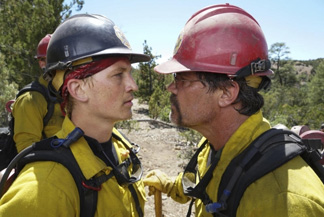Movie Review: Only the Brave
By Matthew Huntley
October 31, 2017
Brendan “Donut” McDonough (Miles Teller), the film's other major character, is new to the crew and joined as a way to shed his drug addiction, and because he's recently learned he's going to be a father. In Prescott, Arizona, the best (and perhaps only major) opportunity for young men like Brendan seems to be firefighting and he shows he's willing to fight for it, even if it means swallowing his pride in the face of other guys like Chris MacKenzie (Taylor Kitsch), who want to see Brendan fail.
“Only the Brave” doesn't have one central or grandiose conflict, but rather a series of smaller, ongoing ones. Its predominant theme is how firefighters must perform a balancing act between their life-threatening yet thrilling jobs and a more settled home and family life. Marsh's wife Amanda (Jennifer Connelly), who works as a horse trainer, wants her husband to free himself of his “addiction,” so to speak, and finally talk about starting a family. It's an argument the couple seems to have routinely and Marsh's answer is that Amanda always knew what she was getting into when they got married—that he would essentially be a firefighter first and a husband second—but she believes people should change.
Brendan believes people can change, too, which is why he's more willing to sacrifice his job for his daughter, but he also knows he runs the risk of falling back into his old habits if firefighting isn't there to feed his need for a rush. For both Marsh and Brendan, and we assume the other Hotshots, their jobs are a means of rising above mediocrity, predictability and boredom. Without it, they don't know who they'd be, which is another subject the film tackles—the idea that men often see their careers as their essence and it takes their family to remind them they can devote just as much time, energy and dedication toward being a good husband and father, which the film doesn't pretend is easy.
Above all else, “Only the Brave” is about people learning, growing and ultimately finding the courage to make sacrifices for others. This may sound hokey, but the film isn't mawkish. It makes its way into our hearts and we become invested in the characters and really listen to them as they struggle. One of the best scenes takes place when Marsh is at his wit's end about his job and marriage and seeks advice from Duane, who asks him what it is that Marsh can live without. Brolin and Bridges are particularly good here and the scene is so natural and strong it causes us to reflect on our lives and priorities.
“Only the Brave” isn't particularly distinct, neither cinematically nor narratively. Its value comes from its humanity and directness. Some scenes feel obligatory, sure, but they all feel true. Given the genre and subject matter, the ending could have been manipulative and fraught with over-the-top action and false sentimentality, but instead it's tense, emotional and deeply moving, culminating in two key closeups of Teller and Connelly and a final exchange between Brendan and Amanda. Moments like these, and several others in “Only the Brave,” stir us and we see a part of ourselves in them. That's probably why it's such an effective drama.
Continued:
1
2
|
|
|
|




